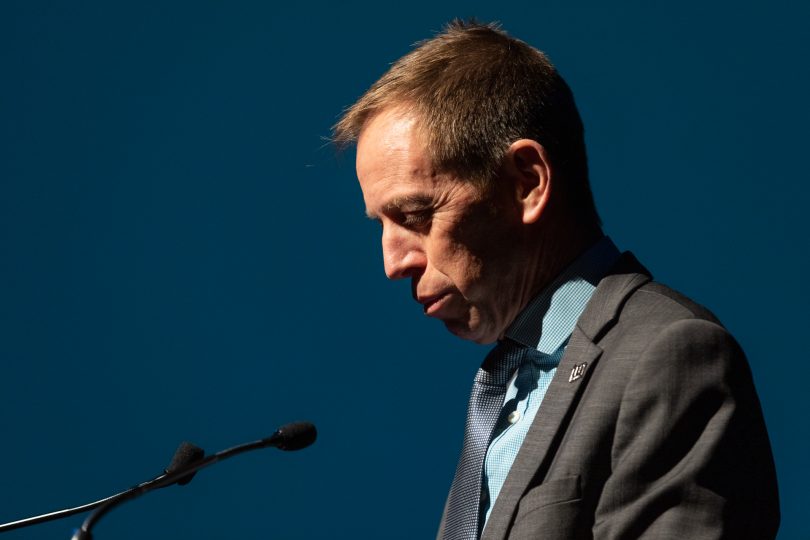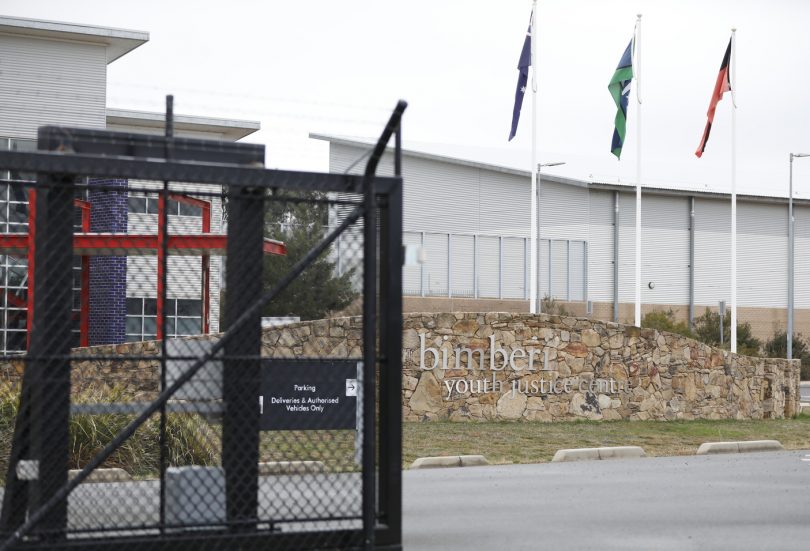
Attorney-General Shane Rattenbury has released a discussion paper about raising the minimum age of criminal responsibility in the ACT. Photo: Michelle Kroll.
Exemptions for serious crimes like murder and the ability of police to arrest young people are among a suite of questions the ACT Government is working through as it continues its push to raise the age of criminal responsibility.
ACT Attorney-General Shane Rattenbury said evidence showed that there should not be exemptions for certain crimes under the age of 14, pushing instead for more diversion services so young people can avoid interacting with the criminal justice system.
“What we do know about young people is that the types of crimes they tend to be involved in are on the lesser end of the spectrum; they tend to be more property offences as opposed to offences against the person,” Mr Rattenbury said.
There are currently no people under the age of 14 imprisoned in the ACT. Around 70 people between 10 and 17 were on community orders or in detention in the ACT each day last financial year, but only three were aged between 10 and 13.
But across Australia, there were 11 to 15 people age between 10 and 13 on youth justice supervision orders each year from 2015-16 to 2019-20.

There are currently no people under the age of 14 imprisoned in the ACT. Photo: Region Media.
When asked why a broad exemption of criminal responsibility was needed for people under the age of 14 when children are deemed incapable of forming criminal intent because of their age, Mr Rattenbury said harm can still be caused when children are held on remand or forced through the court system.
“The national research shows that the application of the principle and the testing of young people’s responsibility is not well understood – it is often quite varied in its application,” Mr Rattenbury said.
“The best research shows that not using the criminal justice system at all is a better response.
“The simple act of being charged and going through that testing process can see a young person spend time on remand so they are already in a custodial facility, so simply avoiding that is a much better approach overall.”
Complications may also arise when criminal organisations try to recruit young people to commit crimes knowing they cannot be criminally responsible. It is illegal to recruit a person to engage in criminal activity. The crime carries a maximum penalty of 10 years in prison if the person recruited is a child.
The government will analyse how well the current provisions protect young people and children, and whether a new offence needs to be introduced to target adults who may exploit children under the revised age of criminal responsibility.
Other potential hurdles raised in the government’s discussion paper, released on Wednesday (23 June), were the ability of police to arrest people between the age of 10 to 14 or investigate crimes that involve people in this age group.
Currently, children under the age of 10 can be arrested by police and taken to a safe place if they are at a crisis point and at risk of harming themselves, property or another person. They cannot be strip-searched and police officers must only do the minimum necessary to stop the child from harming themselves or someone else.
Mental health services or intensive education supports may be required once the child is no longer at a crisis point.
Accountability mechanisms need to be considered where another person or another person’s property is harmed. This may include restorative conferencing, fact-finding investigations or circle sentencing, the discussion paper says.
“The community is going to want to know that young people are being held responsible and that is where a lot of the discussion will be,” Mr Rattenbury said.
What would happen to children already subject to existing court orders like bail, community-based orders or detention, as well as people from other jurisdictions who would serve such orders in the ACT, also needs to be determined.
The extradition of people under the age of criminal responsibility in the ACT but not another jurisdiction also needs clarity.
Feedback on the discussion paper is open until August when a report by prominent child welfare researcher Emeritus Professor Morag McArthur identifying the risks and extra services required to enact the policy successfully is due.
The discussion paper is available at www.yoursay.act.gov.au. Comments are open until 5 August 2021.
The government is aiming to introduce the bill into the Legislative Assembly early next year.





















